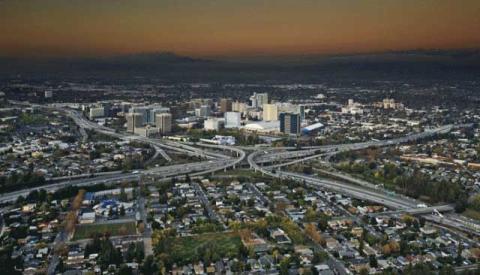California lawmakers put aside party labels this week to engage in an informed conversation with representatives from the tech and manufacturing industries on the need for a comprehensive plan for economic development in California during a panel discussion at the Independent Voter Project Conference.
The panel on economic development was one of a series of 5 panels at the IVP Conference focusing on major issues facing California. The purpose of the panels was to have a substantive conversation about real issues, beyond the larger public dialogue that often reduces serious issues to superficial talking points.
For Full Coverage on the IVP Conference
One major economic concern for California is the increasing cost of operations, including the cost of energy, said a representative from the manufacturing industry in California.
This problem is exasperated by the closure of San Onofre nuclear plant in Southern California. Workplace costs have resulted in billions of dollars of debt owed by employers, not the state. California’s workers’ compensation system has drastically changed since the passage of Senate Bill 863. When companies look at locating in California, they look at all these factors: cost of operations, cost of energy, workplace costs, and regulations. Due to the unpredictability of the future costs in California, companies have been shying away from developing in the state.For tech companies, the accessibility to talent is the biggest factor in deciding where to locate, with more tech jobs than there are qualified employees, a representative from a major tech industry stated.
This prompted a more in-depth discussion of how to expose students to computer science at a young age. Only 15 states in the United States recognize computer science as math and science in school curriculum. In those 15 states, the number of students in those computer science classrooms increased an average of 53 percent.
A huge issue for the tech industry is working to increase the prevalence of computer science in classrooms around the state of California. Living in a knowledge based economy, the knowledge and level of talent is not where it needs to be for economic development in California.
That's why tech companies across the state are getting involved in the immigration reform debate, a representative from the tech industry said.
"It's our preference to get the talent domestically, but when we have such a shortfall of talent we need to get that talent somewhere," the representative explained.
Of the top 10 jobs with the most growth in California, 6 are based in STEM (Science, Technology, Engineering, Math) Education. We need to start exposing students to computer sciences at the K-12 level and expose them to this curriculum early, a tech industry representative argued.
Legislators intercepted the conversations, discussing the obstacles they face in trying to pass legislation on economic development.
"There are several micro-economies in the state, so it's hard to pass legislation in the state of California," a California Assemblymember said.What's best for one district may not be what's best for the state as a whole, challenging lawmakers to try to both accurately represent his or her constituents while advancing economic development for the whole state.
The media today, however, ignores the competing interests lawmakers must take into account in their decision-making process. It's these types of balancing acts that guide the decision-making process, and these types of rational value judgements that don't make headlines.
California needs to get serious about job creation, panelist and legislators all concluded. This means setting partisan differences aside and working together for the future of California. Candid discussions like this, informed by industry experts, are a step in the right direction.
